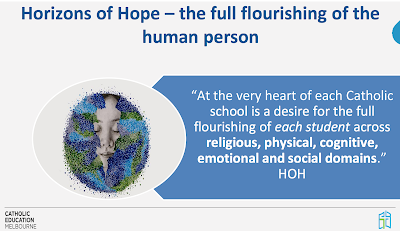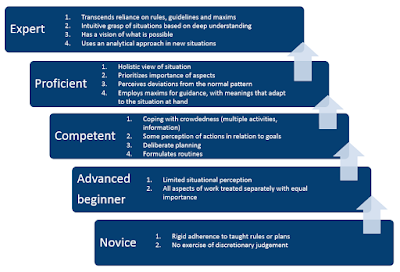 |
| An archaeological "dig" in Rome. |
In April 2019, our leadership team began gathering evidence of student, staff and parent voice to inform our Specific Focus School Review (this link provides background information about the review). The evidence reflected our core value focus around respect and positivity and included records of conversations, emails, See saw posts and notes from meetings with the Student Representative Council. Preparation for the review involved completing a self-assessment of the Leadership and Management, Student Well Being and Religious School Improvement Framework (SIF) Rubrics from Catholic Education Melbourne. We also revisited our Enhancing Catholic Identity survey data and RE surveys in light of the Horizons of Hope education framework for the Archdiocese of Melbourne.
The review led by Mary Wilson (renowned international, executive coach ) took place towards the end of August 2019. The agreed focus question that drove the review was:
How could our research and inquiry culture be further developed to maximise impact for the learner?
Striving to remain loyal to the voice of staff explicitly articulated in a vision narrative developed with the Schools That Deliver Network early in 2018, meant making sure our review specifically aligned with the vision. You can read about the vision process at this link.
In the shared vision it states:
“The whole staff are involved in decisions regarding Action Research. Any research is relevant to the needs of our learners and is used to strengthen outcomes, ensuring the curriculum has a positive and meaningful impact.”
The agreed review methodology was:
1. Staff action research will inform the review and the future focus.
2. The action learning process will be utilised throughout the review period as the data is used to design action, perform the action, gather more data and design new action, perform that action and so on.
3. The review will involve all staff, students and wider community.
4. The review will be led by the leadership team.
How has our research inquiry process maximised impact for our learners ?
What are the things we need to develop further ?
What are the key impacts of our action research based culture ? and What have we done really well ?
Commendations - Based on the data, what are the key things we have embedded with great quality ?
Affirmations - What are we doing well and need to keep working on ?
Recommendations -What are the next steps going forward ?
At the end of the "dig", we met with staff and shared the process but not the treasures with them. Staff were given time to work in pairs and record their commendations, affirmations and recommendations.
SNAP !! When we matched the leadership treasures to the staff treasures - they aligned perfectly.
What are the treasures ? What are the affirmations, commendations and recommendations ?
Once we receive the formal report from Mary, we will proudly share our treasures and our next steps forward.
Rest assured, feedback about the experience of the review was resoundingly positive.
Some of the words and phrases used by staff to describe the review included :
ownership, transparency, collaboration, explicit, supportive, energising, exciting, trust in the process and the facilitator, the archeological dig, the time for rich dialogue and reflection with leadership and staff, triads gave everyone a voice.
One leader said, "In the past, reviews have been academic centred. This was more about the social and emotional well being of the students"
Another leader stated, "I am proud of the progress we have made. We now have a positive staff culture where everyone is committed to our vision and the well being of all learners ".
An archaeological dig unearthed invaluable school treasures.
The treasures align with our vision.
We can be assured that:
Learners leave St Patrick’s self motivated and ready to make a positive impact on their world.










































